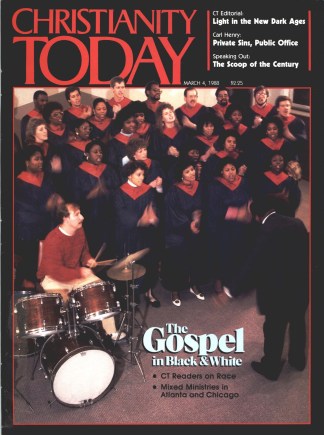Most school people seem to think faculty meetings are a bore. I don’t. I’ve always considered attendance to be a pleasant duty. In fact, I have probably built up some sort of attendance record over my 48 years as a teacher.
At one of our better meetings here at Trinity recently, Prof. Gordon Palmer gave a review of the much talked-about book by E. D. Hirsch, Jr., Cultural Literacy: What Every American Needs to Know (Houghton Mifflin, 1987).
Like a host of other writers during the last decade, Hirsch decries the steady downward trend of grade school and high school achievement scores in spite of the fact that tests themselves have been revised to make them easier for our increasingly illiterate youngsters. Even more devastating is the fact that the very best students of today are scoring dramatically lower than their counterparts a decade ago.
As bad as this is, however, it gets worse. Hirsch’s deepest concern is what he calls cultural illiteracy: a lack of the “basic information needed to thrive in the modern world.” He writes, “Only by piling up specific, communally shared information can children learn to participate in complex cooperative activities with other members of their community.”
And effective communication, as Hirsch demonstrates over and over again, requires not just an ability to read and understand words, but a body of information that serves as a hermeneutical context for words. We not only need to know, but we need to know what others know. Shared information is the key. And this is just what our youngsters are not getting in school.
Hirsch insists we must begin early in the educational process. By the fourth grade, it is already far too late: We have lost the advantage of younger children’s ability to memorize data.
Several things occurred to me as I read and reflected upon Hirsch’s work. Professor Palmer himself pointed out the first: We need a Christian list comparable to Hirsch’s American cultural list. (In the appendix, Hirsch lists approximately 5,000 terms—names, events, dates—that he believes should serve as a guide for refilling the information vacuum created by our schools.)
Every church statistician or Christian educator I know laments the fact that knowledge about religion, the Bible, and Christianity has fallen off. This is certainly true for the general public, but unfortunately it is true for evangelical Christians as well.
In a recent Gallup poll, the vast majority of Americans indicated their belief that the Ten Commandments are valid today and that someday every human will have to answer to God for his or her obedience or disobedience to these commandments. Yet hardly anyone knew what these commandments are. Most could not name even five.
What do we need on a Christian list that provides our young people with sufficient information so they can understand the Bible and what Christianity is all about? Just for starters: the Ten Commandments, a half-dozen favorite psalms, the Beatitudes, the Lord’s Prayer, John 3:1–18, the Love Chapter (1 Cor. 13), a hundred or so select verses on Christian doctrine and ethics, and the Westminster Catechism thrown in for good measure. And for dates: 1400 B.C., 1000 B.C., 722 B.C., 586 B.C., 400 B.C.; A.D. 30, 70, 1054, and 1517. (I’ll leave it up to you to figure out their significance.)
But then a dreadful thought grabbed me: Hirsch’s exhaustive list is what people don’t know. How impoverished we are in seeking to communicate our biblical faith to the world. Every time I hear a radio or television sermon, I find myself wondering how much of this non-Christians understand. What does a reference to “the blood” communicate to them? What meaning do they have for law, sin, grace, regeneration, righteousness, and the basic vocabulary of Christian faith?
Francis Schaeffer used to speak of “pre-evangelism.” Maybe this is what he meant. We can’t wait to preach the gospel until the educational level of our society is raised to Hirsch’s standards. But neither can we ignore it.
KENNETH S. KANTZER










